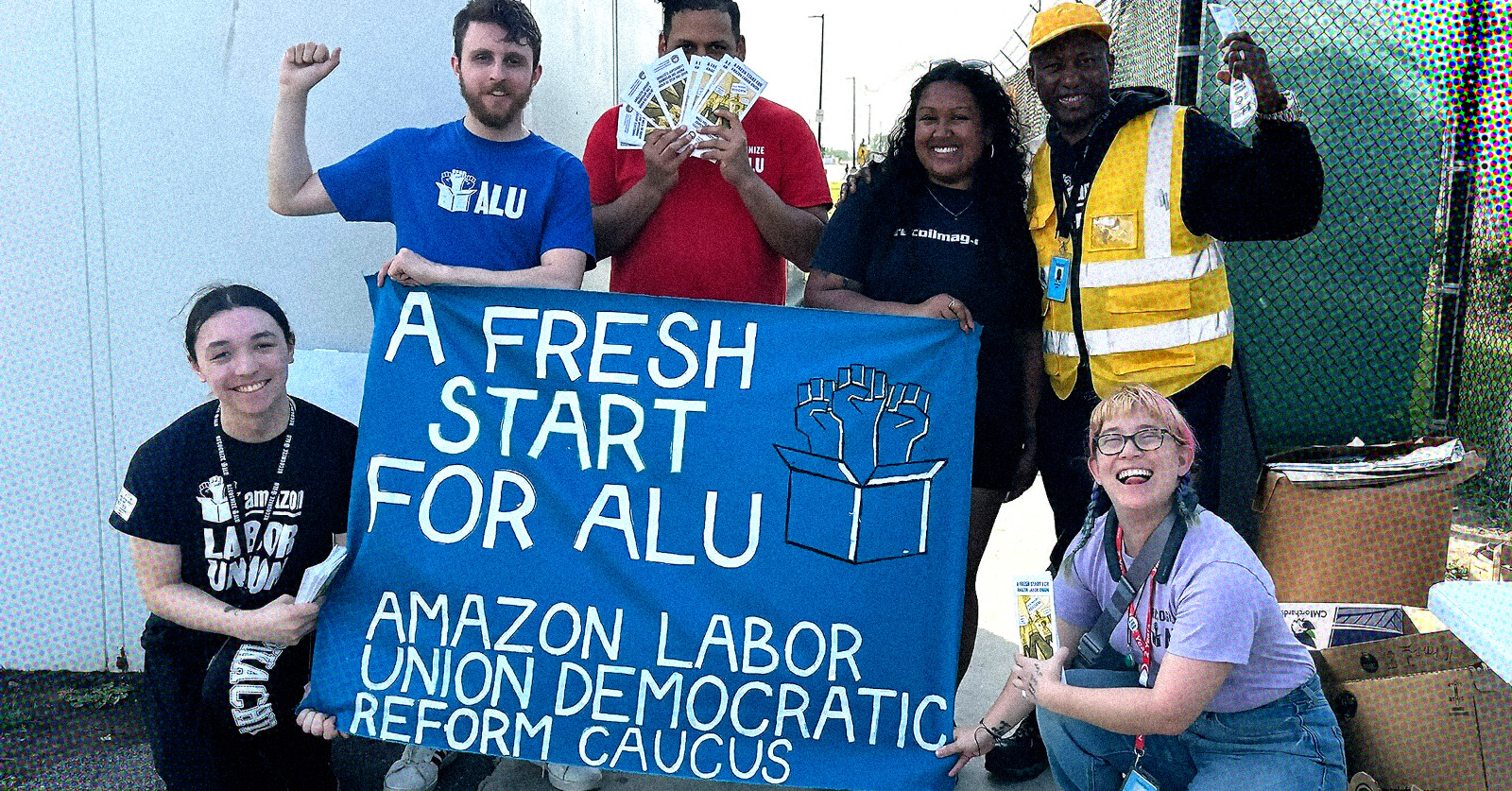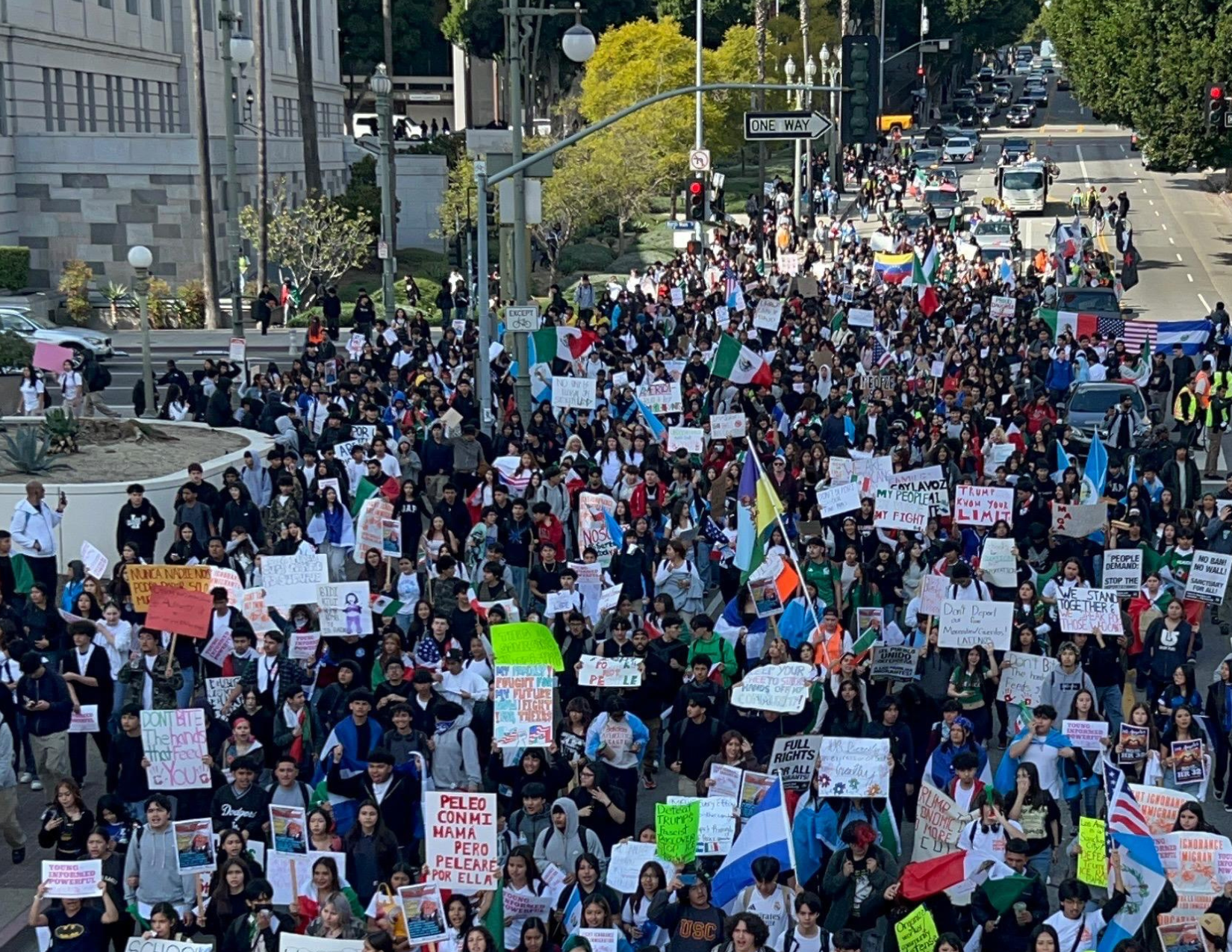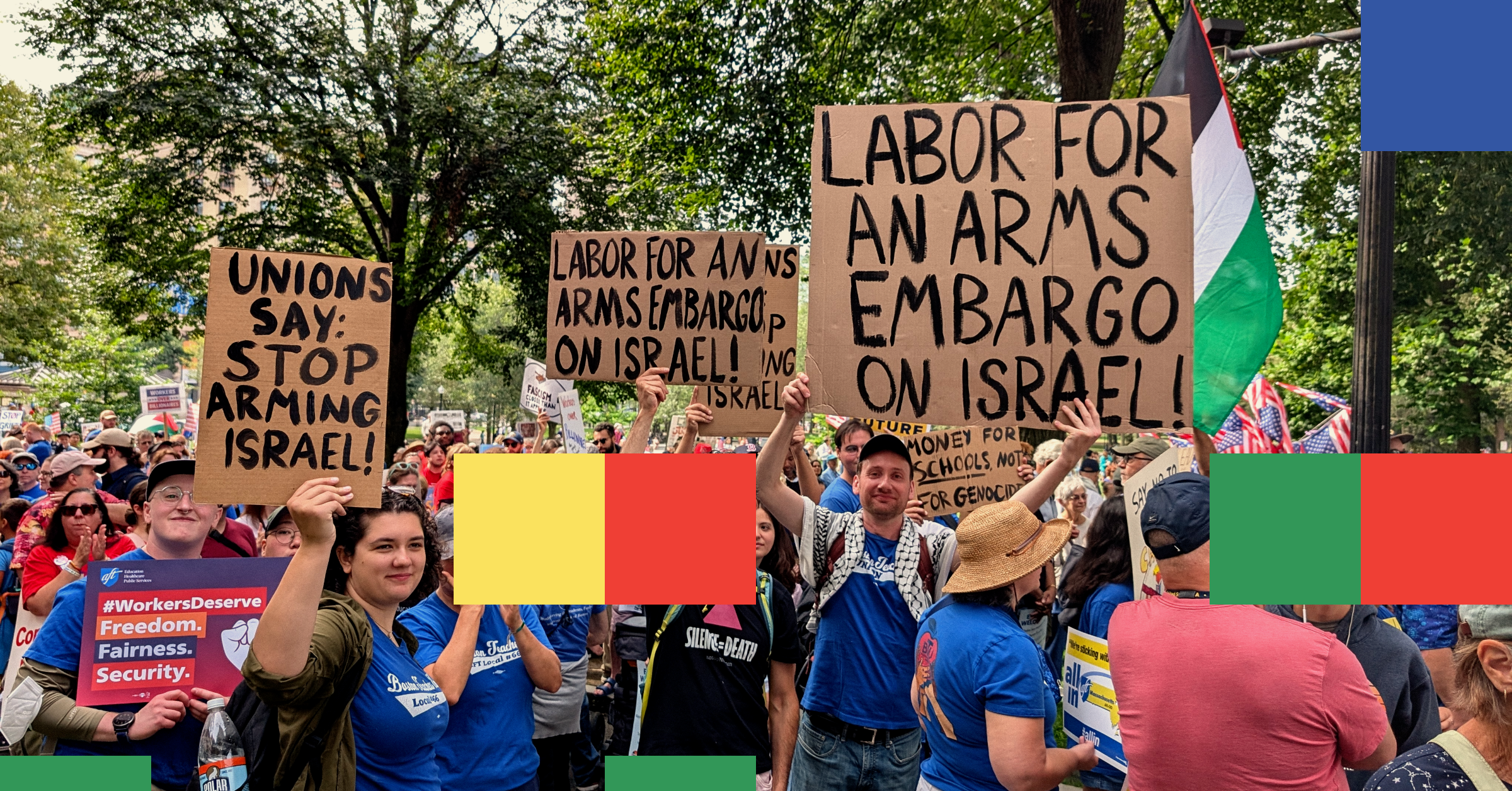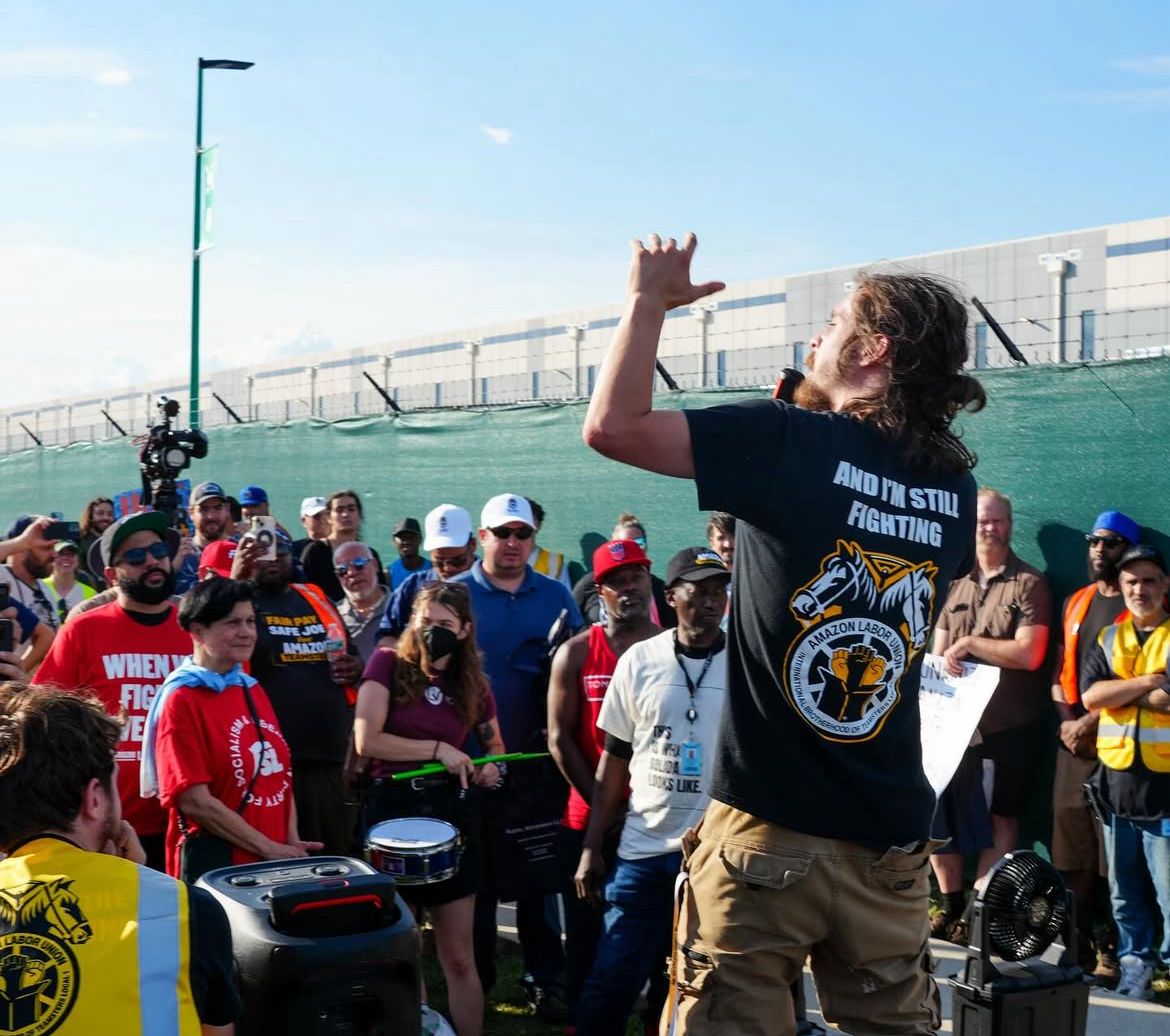In April 2022, my co-workers voted to unionize with the Amazon Labor Union (ALU), making the JFK8 Fulfillment Center in Staten Island the first unionized Amazon facility in the United States. More than two years later, the rank and filers of the ALU like myself are still without a contract, meaning that we are still subjugated to the working conditions Amazon wants to give us, all while JFK8 site management boasts of its “one million unit days,” meaning the associates at our one warehouse picked, packed, and shipped over a million units in a 24-hour time frame.
From this unchecked mistreatment by Amazon and widely felt frustration with the ALU’s perceived lack of progress, a new organizing-focused group, the ALU Democratic Reform Caucus, arose in December 2022, laying the groundwork for a struggle that will actually bring Amazon to the table.
But what is it actually like to work at an Amazon warehouse? If you were to ask the vast majority of Amazon workers, the answer would be simple — it sucks.
Draining Work
At JFK8, we are subjected to long and draining hours, with most employees working 10- to 12-hour shifts. During these long shifts, we deal with a plethora of problems. Our building suffers from insufficient air conditioning, which, when combined with intensive physical labor, puts the health of myself and my coworkers at risk. In my home department, Outbound Ship Dock, we deal with broken-down equipment, such as carts with busted wheels or broken doors that won’t properly secure shut, and pallet jacks that are so old that they are lopsided. We have conveyors that are in desperate need of repair.
Our productivity quotas are stressful; failure to meet them leads to productivity write-ups, which can quickly lead to termination, despite the broken equipment. We deal with intensive manual labor as well, and with there being no easy job, everyone is at risk of repetitive strain injuries. Whether you are a palletizer who is being pushed to scan and stage over 300 packages in an hour with perfect accuracy, or a “waterspider,” Amazon’s term for a worker designated to pull and transport heavy, filled carts and pallets into trailers, or an induct operator, where you have to rapid-fire scan small packages at a rate of 1,600 units per hour, you are constantly at risk of straining your body.
Amazingly, we put up with all of this for subpar pay, far below a living wage in New York City and far below what we deserve. The low pay has led many of my coworkers to pick up unhealthy amounts of overtime, or forced them to work an additional job on top of this strenuous manual labor. Amazon also leads the warehousing industry in injuries. It is abundantly clear that conditions need to change — through building strong, democratic unions.
Radicalization Through the Labor Movement
I moved to Staten Island from Connecticut and transferred from the BDL5 Amazon Sortation Center to JFK8 in June 2022. The massive four-story fulfillment center had already won its union representation election, but I didn’t arrive with the goal of taking a union job. Had you said the term “rank and file” to me back then I would have had no idea what you were talking about. I knew about the union election and was happy that the ALU had won, but I had very little understanding of how unions actually worked. I just understood them to be good, and was willing to be a supporter.
However, after becoming increasingly frustrated with stagnant wages and lackluster time-off options, watching the health of my hands deteriorate, and witnessing countless instances of management mistreating my co-workers, I made a conscious decision to get more involved.
As I became ingrained into my union by attending meetings and organizer trainings and continuously building cherished relationships with my coworkers, I became more capable as an organizer. The more I learned, the more I became radicalized to socialist politics, and the more I understood the importance of the rank-and-file strategy.
In the ALU Democratic Reform Caucus, we do shop floor organizing; we have one-on-one conversations with our coworkers to talk about the job and to figure out what issues they care about. We have led multiple collective actions, including circulating petitions to amend our union’s constitution to guarantee officer elections, petitions to call on Amazon to stop union busting and to reinstate fired organizers, and a petition calling on Amazon to standardize its headphone policy across the network so that JFK8 workers would be allowed to listen to music on shift. We have marched on the boss three times to confront site leaders and deliver the signatures, increasing pressure on the company to adhere to our demands, all while radicalizing and engaging more and more of our coworkers. With these signatures, we’ve built incredible lists to keep each other engaged and informed.
Our efforts also include having saved people’s jobs, and even leading a walkout last October to demand higher wages, job security, and an easier accommodations process for pregnant workers. This was the first pre-planned walkout since our union representation election back in April 2022.
Last, we embrace learning labor history and organizing strategy from experienced organizers, having received guidance from veteran labor organizers like Gene Bruskin and Jane McAlevey. Many of us have read Labor Notes’ Secrets of a Successful Organizer so that we can learn and apply the fundamentals. We strongly adhere to the rank-and-file organizing approach we have been taught.
Why Amazon?
Taking on Amazon is one of the most important fights the labor movement is battling in the twenty-first century. The second-largest employer in the United States, Amazon owns a sizable stake in the U.S. economy, having bought out over 100 companies to turn them into subsidiaries. Amazon is truly the epitome of capitalism; it enriches its executives and shareholders while hurting and exploiting its employees and the communities they come from. It is not only a strategic target for its sheer size and control, it also offers opportunities for mass radicalization as it continuously inspires anger through mistreatment.
However, bringing a company like Amazon to heel is easier said than done. Amazon is a multi-trillion-dollar company that contributes heavily to Republicans and Democrats alike, at the local level and the national level. The company has spent and will continue to spend millions of dollars on union-busting consultants and law firms. The task of taking on Amazon is monumental, but it is one that can be won.
With the rise of the ALU Democratic Reform Caucus to turn the Amazon Labor Union into a fighting union, together with the dozens of local organizing committees at Amazon, either independent or affiliated with the Teamsters or American Postal Workers Union, coupled with Amazon’s universally poor working conditions that are ripe for organizers to agitate around, socialist unionists have the perfect opportunity to build the worker movement to force Amazon to the table.
The Job of Socialists Is to Build the Labor Movement
Thankfully, more socialists have been taking rank-and-file jobs. The Rank and File Project, for example, exists to provide political education and organizer training for interested socialists, while connecting them with jobs where they can organize. It also helps worker activists who are already on the job, providing strategic industries with more hands to help. We can accelerate radicalization in the labor movement if we are willing to put in the work by taking rank-and-file jobs and organizing on the shop floor.
How Do We Win?
We at JFK8 will soon face union leadership elections, in June or July. The candidates offer different perspectives on how to bring Amazon to the table. The ALU Democratic Reform Caucus is running a slate that campaigns on democracy, transparency, and a commitment to organizing rather than simply a legal strategy, and believes that our candidates have the skills needed for reforming the Amazon Labor Union.
In addition to our daily tackling of workplace issues, worker-organizers from the ALU Democratic Reform Caucus have organized regular, high-participation rank-and-file meetings where my coworkers and I share information and experiences and give input on organizing projects, as well as organizer trainings for our coworkers so that they can be armed with the same organizing tools we have learned. We have regularly flyered and campaigned outside our warehouse and hosted pop-up food pantry events. At these events, in addition to providing crucial mutual aid to our coworkers in the form of free groceries, we are able to have dozens of one-on-one conversations, get leads with coworkers that are interested in getting more involved, and provide hundreds with union literature.
As the working class becomes increasingly frustrated with the conditions in which we live, many will find themselves turning to organized labor to improve their livelihoods. As socialists, one of the most vital places to aid this working class fight is at Amazon. We can build a democratic, politically radicalized labor movement capable of bringing Amazon to its knees, so that its days of exploiting us will cease.




